October and November are prime committee months for the Association. and headquarters staff was occupied three out of four weekends in the month with the three divisional committees and other interdisciplinary meetings that share the same fondness for weekend conclaves. (Since the Association’s budget benefits from stay-over-Saturday-night airline discounts, we hasten to add that if our committee members are willing to sacrifice their non-teaching time, we gratefully accept!)
The Research Division met on October 20–21 in Washington. It had many items of business relating to the AHA’s panoply of prizes, and the committee duly proposed a number of changes in three existing book awards. Also discussed were ideas for a future prize for the best book relating to the African diaspora, and specific proposals were authorized for exploration. A concept for a prize for an outstanding film or video was referred to the Teaching Division for further comment. and two future well-endowed new book prizes were considered.
The subject of the AHA annual meeting generated several items of interest The committee blessed, and recommended to the Council, the new Committee on Minority Historians being guaranteed a slot for an annual meeting session hereafter, such as the Committee on Women Historians enjoys. A small change in Program Committee guidelines was instituted at the behest of the Council to distinguish between Association requirements and Program Committee desiderata not directed by the AHA’s guidelines. Potential Program Committee chairs for the 1995 and subsequent annual meetings were discussed, and the Research Division reached a decision on prioritizing topics to be sponsored by it for next year’s meeting.
The committee also awarded ten Bernadotte Schmitt grants for research among forty applicants, disbursing a total of $5,000.
The Teaching Division held its fall meeting on October 26th. The group reached a decision to sponsor a memorial fund drive honoring the late Mary K. Bonsteel Tachau, whose loss is sorely felt by the Teaching Division and by her host of friends and admirers. (See page 5.)
A number of teaching prizes and awards were discussed. Plans for the first Nancy Lyman Roelker Mentorship award. to be presented next year, were finalized, and a proposed prize for film and video was recommended to the Professional Division and the Council.
Turning to the Association’s various teaching pamphlets, the Division decided to remainder several obsolescent titles and to replace others with new editions. The thirteen chapters on U.S. history, edited by Eric Foner for his Temple University Press book, The New American History, will be available as individual titles by the time this issue of Perspectives reaches members. The Division as is its practice also devoted some time to identifying notable teachers from secondary schools and two- and four-year colleges, who might be considered for AHA elective or appointive offices.
Finally, the Teaching Division decided to seek cooperation from the Professional Division in preparing a draft statement on ethical standards for teaching as a possible addendum to the Association’s Statement on Standards of Professional Conduct.
The AHA’s Professional Division met November 3–4 in Washington, swimming desperately in a sea of paper resulting from numerous cases relating to the Association’s Statement on Standards of Professional Conduct. Seven previously resolved cases generated some degree of follow-up activity, while five new cases were discussed. Two of these new com plaints were found to be not viable cases under the Statement on Standards, while one complaint was mooted by the fact that the person against whom the allegations were reported is deceased. The other two new complaints were accepted for future decision after both sides have had ample opportunity to respond. Five informal inquiries relating to possible problems were discussed, one of which was converted to a formal case for future resolution. Others were resolved to the satisfaction of the Committee by a series of informal advices to participants.
Several Professional Division recommendations were prepared for the Council at its December meeting, relating both to cases and to other Committee business. An Association paper setting forth our views on the proper relationship between filmmakers and historians in collaborative projects was recommended. The Council is also being asked to consider establishing a new policy regarding job advertising from institutions found to be in violation of our professional standards.
The operation of the AHA’s Job Register and the Employment Information section of Perspectives generated considerable discussion. The perennially difficult question of searches which educational institutions design only for a limited segment of the historian population was hotly debated. While the AHA must and does oppose discriminatory recruitment, it is willing within that standard to permit court-mandated and other legal special searches to be listed in our publications.
The Professional Division has a special responsibility for Perspectives, the Association’s newsletter, and discussed a number of future articles on subjects such as good manners and efficiency in job interviewing, a further summary of cases decided by the Division on questions of professional conduct, and publication of critical letters and responses in its columns.

